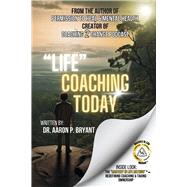"LIFE" COACHING TODAY
, by Bryant, Dr Aaron P.- ISBN: 9798350981353 | 8350981350
- Cover: Paperback
- Copyright: 1/1/2025
Today, coaching is recognized as a powerful tool for facilitating personal and professional development. The principles and techniques developed over centuries have been refined and adapted to meet the needs of modern individuals and organizations.
Coaching helps individuals identify their goals, overcome obstacles, and achieve their full potential by fostering self-awareness, accountability, and continuous improvement.
This book reviews the impact of coaching as it extends beyond individual development. In organizational settings, coaching has been shown to enhance leadership effectiveness, improve team performance, and drive organizational change (Hawkins, 2012). By promoting a culture of continuous learning and development, coaching contributes to organizations' overall success and sustainability.
The search for personal development and advancement has always been a part of human history, cutting across all cultures, eras, and civilizations. People have looked toward mentorship and direction throughout history as they pursued self-realization and fulfillment, from the philosophical discussions of ancient Greece to the scientific investigations of the Enlightenment. Nonetheless, the coaching profession arose in the furnace of modernity, combining millennia of experience into a systematic approach to human growth.
It charts coaching history from its early origins to its present status as a respected profession. Pivotal moments and historical events have shaped the evolution of coaching, shedding light on the birth of the fundamental ideas and techniques that steer its contemporary application.
The concept of mentorship has been woven into the fabric of human civilization for centuries. In ancient Greek philosophy, the Socratic method embodied the idea of a wise mentor guiding individuals through self-reflection and critical thinking (Plato, 2002).
Socrates engaged his students in dialogues designed to challenge their assumptions and stimulate intellectual growth. This Today, coaching is recognized as a powerful tool for facilitating personal and professional development. The principles and techniques developed over centuries have been refined and adapted to meet the needs of modern individuals and organizations.
Coaching helps individuals identify their goals, overcome obstacles, and achieve their full potential by fostering self-awareness, accountability, and continuous improvement.
The impact of coaching extends beyond individual development. In organizational settings, coaching has been shown to enhance leadership effectiveness, improve team performance, and drive organizational change (Hawkins, 2012). By promoting a culture of continuous learning and development, coaching contributes to organizations' overall success and sustainability.
Coaching helps individuals identify their goals, overcome obstacles, and achieve their full potential by fostering self-awareness, accountability, and continuous improvement.
This book reviews the impact of coaching as it extends beyond individual development. In organizational settings, coaching has been shown to enhance leadership effectiveness, improve team performance, and drive organizational change (Hawkins, 2012). By promoting a culture of continuous learning and development, coaching contributes to organizations' overall success and sustainability.
The search for personal development and advancement has always been a part of human history, cutting across all cultures, eras, and civilizations. People have looked toward mentorship and direction throughout history as they pursued self-realization and fulfillment, from the philosophical discussions of ancient Greece to the scientific investigations of the Enlightenment. Nonetheless, the coaching profession arose in the furnace of modernity, combining millennia of experience into a systematic approach to human growth.
It charts coaching history from its early origins to its present status as a respected profession. Pivotal moments and historical events have shaped the evolution of coaching, shedding light on the birth of the fundamental ideas and techniques that steer its contemporary application.
The concept of mentorship has been woven into the fabric of human civilization for centuries. In ancient Greek philosophy, the Socratic method embodied the idea of a wise mentor guiding individuals through self-reflection and critical thinking (Plato, 2002).
Socrates engaged his students in dialogues designed to challenge their assumptions and stimulate intellectual growth. This Today, coaching is recognized as a powerful tool for facilitating personal and professional development. The principles and techniques developed over centuries have been refined and adapted to meet the needs of modern individuals and organizations.
Coaching helps individuals identify their goals, overcome obstacles, and achieve their full potential by fostering self-awareness, accountability, and continuous improvement.
The impact of coaching extends beyond individual development. In organizational settings, coaching has been shown to enhance leadership effectiveness, improve team performance, and drive organizational change (Hawkins, 2012). By promoting a culture of continuous learning and development, coaching contributes to organizations' overall success and sustainability.






